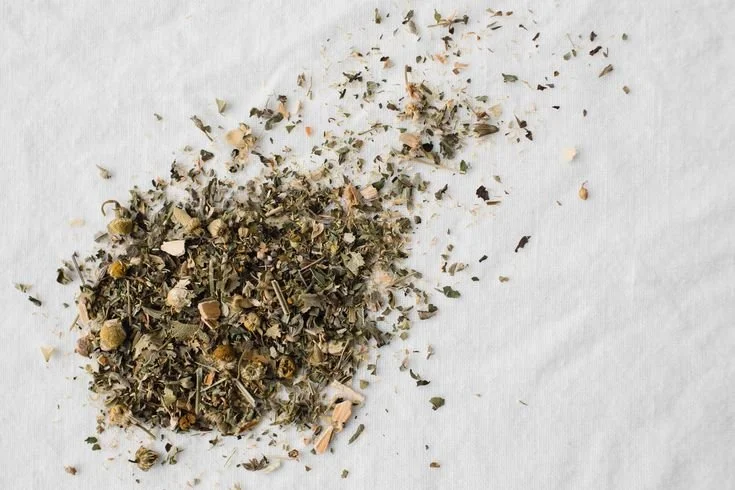The Holy Grail | Holy Basil (aka Tulsi)
History of Holy Basil | Tulsi
Native to India, Holy basil is an aromatic, perennial shrub. This powerful plant holds deep roots as a medicinal herb used frequently in Ayurvedic medicine and is considered sacred in Hinduism. It is often used in ceremonies and has been given the name Tulsi meaning "the incomparable one" in Hindu culture.
Native to India, Holy basil is an aromatic, perennial shrub. This powerful plant holds deep roots as a medicinal herb used frequently in Ayurvedic medicine and is considered sacred in Hinduism. It is often used in ceremonies and has been given the name Tulsi meaning "the incomparable one" in Hindu culture.
It is so fascinating how the indigenous people were so connected to the earth that they could harness the power of the plants through intuition and tradition without science. However, our modern society leans on practical proven applications. That being said, our science has simply strengthened the legitimacy of the practice of our ancestors and cultures that came before us. In animal models, holy basil is shown to have pain-relieving effects and analgesic activity, which is often accredited partly to the eugenol constitute. When used topically and orally, holy basil seed oil has been shown to increase the survival rate of animals with carcinogenic tumors. Further, oral treatment with holy basil leaf extract has been shown to increase the activity of enzymes known to detoxify carcinogens. Holy basil is shown to have anti-carcinogenic, antioxidant, and detoxifying properties, making it an extremely powerful herb.
The linolenic acid component of holy basil leaf extract and seed oil reduces inflammation and inhibits the COX pathways of the arachidonic and acid metabolism. It has been shown to lower levels of total cholesterol and triglycerides in the blood, liver, heart, and kidneys in animal models. A study on patients with type 2 diabetes treated with 2.5 grams of holy basil leaf powder daily for 4 weeks showed a significant reduction of total cholesterol levels.
Medicinal effects:
Holy basil is shown to inhibit powerful antimicrobial effects including inhibiting Candida albicans, which is a very common overgrowth in the US and can be linked to infections such as yeast and urinary tract infections in women. Holy basil is also shown to inhibit various bacterial pathogens including the notorious Escherichia coli and Salmonella typhi.
Antioxidant effects:
Holy basil polysaccharides have been shown to have high antioxidant activity and constituents of holy basil, including eugenol, have shown antioxidant activity. Also, evidence from animal research shows that holy basil leaf extracts and holy basil polysaccharides can reduce lipid peroxidation which is the process by which oxidants such as free radicals attack lipids containing polyunsaturated fatty acids, resulting in cell damage. i
Anti-stress effects:
In Ayurvedic medicine Holy basil is recognized as an anti-stress and adaptogenic remedy. Combinations of various herbs and adaptogenic products such as holy basil, ashwagandha, asparagus, and Indian gooseberry can help to reduce several measures of the stress response.
Anti-toxin effects:
There is preliminary evidence that holy basil extract can decrease mercury toxicity in animal models.
Anxiolytic properties:
Treatment with holy basil extract as an anti-stress herb has been shown In clinical research to improve symptoms of stress and/or generalized anxiety disorder.
Cardiovascular effects:
The seed oil of holy basil can prolong bleeding time by inhibiting platelet aggregation in our blood. This herb seems to have a hypotensive effect as a vasodilator, resulting in the blood that flows more easily through the vessels and increased circulation.
Endocrine effects:
Holy basil can improve glycemic response and thyroid function and has significant hypoglycemic activity.
Interestingly, animal research suggests that holy basil leaves decrease reproductive behavior in men, particularly sperm count, sperm motility, and possibly fertility, however, sperm parameters return to normal 2 weeks after discontinuing treatment. This could be a very interesting finding for the future of male birth control.
Gastrointestinal effects:
Holy basil seed oil and holy basil extract act as a protective agent in our stomach by harmoniously reducing gastric acid secretion, while increasing mucin secretion.
Radioprotective effects:
Following exposure to radiation, various studies have concluded that holy basil leaf extract protects against radiation injury and increases survival
Teeth strengthening properties:
Rinsing out your mouth 2x a day with 10 mL of a solution containing tea tree oil, clove, holy basil, and water can reduce plaque formation by 64%, compared to 74% in traditional mouthwash, which comes with alcohol and various chemicals that can be harmful to our health.
REFERENCE :
The Review of Natural Products by Facts and Comparisons. St. Louis, MO: Wolters Kluwer Co., 1999. LINK


